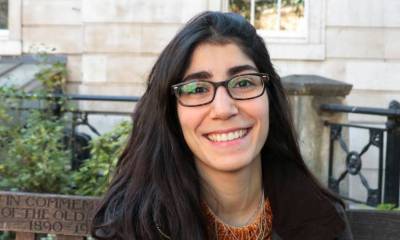Julia Marotti, MSc Developmental Psychology and Clinical Practice

Julia Marotti is a second year student studying MSc Developmental Psychology and Clinical Practice at UCL Division of Psychology and Language Sciences.
1. What is your educational background?
I studied a BSc degree in psychology at UCL, then after a year off I did my MSc at the UCL Anna Freud Centre.
2. What are your motivations for pursuing a graduate-level qualification?
I was motivated to continue learning and developing my passion for working with children and adolescents in mental health. My graduate-level qualification provided further teaching with a clinical focus as well as a placement year which was an invaluable experience. I was also motivated by the opportunity to develop a career in clinical psychology.
3. Why did you apply to UCL for graduate study?
The MSc in Developmental Psychology and Clinical Practice is unique. Very few graduate courses provide such an array of teaching, research and work placements. This is one of the main reasons I applied to UCL for graduate study.
4. What is the best thing about your course?
The best thing about my course is that it equips me with multiple perspectives in mental health and child development. It is taught by experienced clinicians and researchers, who are top in their field. We receive practical training through the modules focusing on teaching the clinical skills needed to help families managing difficulties.
Through a work placement, this learning was applied in a real-world mental health setting. This provided me with a unique learning experience, to prepare me for a clinical career. Overall, this course is well-rounded and ticked all the boxes for me (academic teaching, research and training focused on the clinical aspects).
5. What do you find interesting about your field of study and what inspires you?
Child and adolescent mental health is a field of study that I believe is fundamental. The more it is studied and we understand it, the easier it will be to develop and improve the support that is provided to families managing mental health difficulties. This field of study inspires me to continue growing and develop my skills to contribute to this field.
6. What are your career plans once you’ve completed your current programme of study at UCL?
When I complete my current programme, I will look for a job that allows me to further develop and apply my clinical skills in child and adolescent mental health. In the future, I may explore further training in clinical psychology.
7. Do you think studying at UCL Faculty of Brain Sciences is a good investment?
My MSc was a very good course and was worth the two years investment.
8. Have you undertaken any networking opportunities either as part of your degree or outside of your studies?
I have attended an Alumni and Careers Evening at the Anna Freud Centre that was really helpful for thinking about next steps.
9. What is it like studying in London and how do you think it has benefited your studies?
London is a vibrant, multi-cultural, diverse, historical city which I believe enriched my studies in several ways. This includes being taught by leaders in their field because London has so many hubs of excellence in psychology and mental health with lecturers coming from a multitude of backgrounds, so my learning was excellent and varied. Moreover, knowing more about the services available in London in mental health enriched my studies in considering next steps. Also, I really enjoyed the experience of living as a student in London, there are endless places to go and things to see and I hope to remain here.
10. Has there been an element of your degree programme that has impressed you or been particularly valuable?
The practical teaching element of my programme was particularly valuable. At first I was drawn to the course for its varied perspectives on teaching but the clinical aspects became an incredible learning experience such as, formulation, therapeutic relationship and assessment skills. Access to placement was impressive also, this allows students to have varied experiences.
 Close
Close

